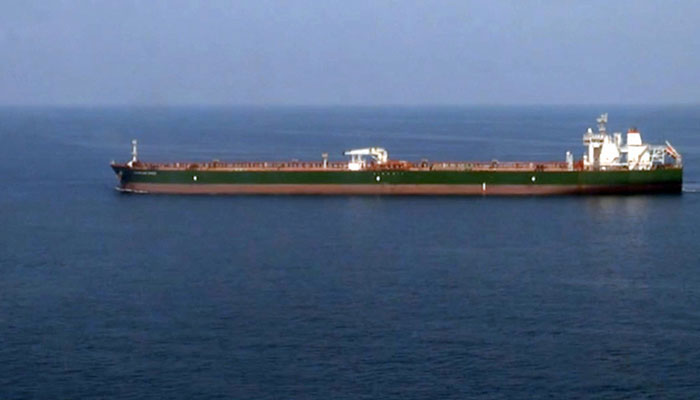What if Iran blocks Strait of Hormuz?
In view of experts, any disruption could send prices skyrocketing, destabilize economies and trigger new energy crisis
ISLAMABAD: The world is on the brink of a global economic crisis as Iran threatens to block the Strait of Hormuz, a narrow 33-kilometer-wide stretch of water carrying a fifth of the world’s daily oil supply.
While this strategic waterway remains open for now, analysts fear escalation by the US-backed Israel could put the vital shipping route at risk if Iran chooses to impose a blockade or attack the vessels. In view of experts, any disruption could send prices skyrocketing, destabilize economies and trigger a new energy crisis.
The oil lane is so vital because no real alternatives exist. Most Gulf oil cannot be rerouted without massive delays. It is the only deep-water route capable of handling the world’s largest crude tankers.
According to the US Energy Information Administration, 20 million barrels of oil — 20 percent of global consumption — pass through the Strait of Hormuz every day, along with one-fifth of world’s liquefied natural gas trade, primarily from Qatar.
Pundits of economy fear closure of the route could cause sudden oil price surge that would increase inflation, energy costs and disrupt industries across Europe. Manufacturing, transport and agriculture sectors would be especially vulnerable. Market reactions and volatility in European stock exchanges could be a knock-on effect.
Further, a blockade could further trigger military confrontations involving the US, EU navies and Gulf states, risking a broader regional war. Europe might be drawn into the conflict through NATO obligations or alliances, especially with countries like France or the UK maintaining naval presence in the region.
Beyond oil, the Strait is a key route for global shipping. Disruption could delay European imports of raw materials, electronics and consumer goods, affecting supply chains. Insurance premiums for shipping could spike, raising costs for European businesses and consumers.
According to Independent Commodity Intelligence Services, the end-result would be a loss of 312,000 tonnes of total Middle East HDPE exports, 240,000 tonnes of LDPE and 370,000 tonnes of LLDPE, assuming the waterway is completely shut for a month. This would account for between 8-14pc of our assessments of global monthly production of HDPE, LDPE and LLDPE.
The damage wouldn’t end with the loss of Middle East petrochemicals exports. The loss of exports would be just the tip of the iceberg. “The Strait of Hormuz is the world’s most important oil chokepoint because of large volumes of oil that flow through the Strait. In 2018, its daily oil flow averaged 21 million barrels per day, or the equivalent of about 21pc of global petroleum liquids consumption,” writes the US Energy Information Administration in its latest review of the energy corridor’s importance.
An escalation in the Middle East conflict could have a “huge impact on global trade”, the boss of the oil company Shell has warned, as Donald Trump suggested US could enter the air war between Israel and Iran.
Shell, one of the biggest traders of oil and natural gas in the world, said it had contingency plans in case the conflict disrupted flows from the region. There is a risk a blockage in the Strait of Hormuz could shock the energy market.
Reports suggest with the fall in oil, naphtha and natural gas-liquids exports would come a fall in petrochemicals production outside the Middle East. Many refinery-petrochemicals complexes and standalone steam crackers, based on imported Middle East oil and naphtha, would have to cut production.
Similarly, affected would be propane dehydrogenation plants dependent on Middle East propane. Condensate splitters, which convert Middle East condensates into light and heavy naphtha for petrochemicals production, would also struggle to operate.
-
 Paul Anka Reveals How He Raised Son Ethan Differently From His Daughters
Paul Anka Reveals How He Raised Son Ethan Differently From His Daughters -
 'A Very Special Visitor' Meets Queen Camilla At Clarence House
'A Very Special Visitor' Meets Queen Camilla At Clarence House -
 Jodie Turner Smith Shares One Strict Rule She Follows As A Mom
Jodie Turner Smith Shares One Strict Rule She Follows As A Mom -
 Hailey Bieber Reveals KEY To Balancing Motherhood With Career
Hailey Bieber Reveals KEY To Balancing Motherhood With Career -
 Photo Of Jay-Z, Other Prominent Figures With Jeffrey Epstein Proven To Be Fake
Photo Of Jay-Z, Other Prominent Figures With Jeffrey Epstein Proven To Be Fake -
 Hillary Clinton's Munich Train Video Sparks Conspiracy Theories
Hillary Clinton's Munich Train Video Sparks Conspiracy Theories -
 Fans Slam Talk Show Host For 'cringe' Behavior In Chris Hemsworth Interview
Fans Slam Talk Show Host For 'cringe' Behavior In Chris Hemsworth Interview -
 Woman Jailed Over False 'crime In Space' Claim Against NASA Astronaut
Woman Jailed Over False 'crime In Space' Claim Against NASA Astronaut -
 James Van Der Beek’s Close Pal Reveals Family's Dire Need Of Donations
James Van Der Beek’s Close Pal Reveals Family's Dire Need Of Donations -
 Prince William And Harry's Cousins Attend 'Wuthering Heights' Event
Prince William And Harry's Cousins Attend 'Wuthering Heights' Event -
 Hailey Bieber Turns Heads Just Hours After Major Business Win
Hailey Bieber Turns Heads Just Hours After Major Business Win -
 King Charles' Andrew Decision Labelled 'long Overdue'
King Charles' Andrew Decision Labelled 'long Overdue' -
 Timothee Chalamet 'forever Indebted' To Fan Over Kind Gesture
Timothee Chalamet 'forever Indebted' To Fan Over Kind Gesture -
 Columbia University Sacks Staff Over Epstein Partner's ‘backdoor’ Admission
Columbia University Sacks Staff Over Epstein Partner's ‘backdoor’ Admission -
 Ozzy Osbourne's Family Struggles Behind Closed Doors
Ozzy Osbourne's Family Struggles Behind Closed Doors -
 Dua Lipa Claims Long-distance Relationship 'never Stops Being Hard'
Dua Lipa Claims Long-distance Relationship 'never Stops Being Hard'




